- Home
- Maurice Druon
The Lily and the Lion Page 14
The Lily and the Lion Read online
Page 14
After the vomiting, which lasted three days, she was attacked by a sort of catarrh of the throat and chest and could not swallow without great pain. Her physicians declared she had caught a chill during her indigestion. Then, when her pulse began to weaken, they thought she had been bled too much; and then her skin broke out into spots and boils all over her body.
Attentive, thoughtful, always at hand, her manner as calm and smiling as any patient could wish, Beatrice took great delight in watching the loathsome progress of her handiwork. She scarcely ever went to see Robert; but the daily problem of which dish or medicine to lace with poison afforded her pleasure enough.
When her hair started falling out in grey tufts like musty hay, Mahaut realized she was dying.
‘I’ve been poisoned,’ she said in her agony.
‘Oh, Madame, Madame, don’t say such a terrible thing,’ Beatrice replied. ‘Your last dinner before being taken ill was at the King’s.’
‘That’s just what I’m thinking,’ said Mahaut.
She was still difficult and hot-tempered, inclined to rate her physicians and call them donkeys. She showed no sign of desiring the consolation of religion, and was more concerned with the affairs of her county than with those of her soul. She dictated a letter to her daughter. ‘Should I die, I command you to go to the King at once and insist on rendering homage for Artois before Robert can attempt anything …’
The pain she was suffering never for an instant made her think of the agonies she had inflicted on others in the past; she remained hard and self-centred to the end, and even the approach of death aroused in her no urge to repentance, no sign of human compassion.
Nevertheless, she thought it desirable to confess to killing two kings, crimes she had never admitted to her ordinary confessors. For this purpose she summoned an obscure Franciscan; and when the monk emerged, pale and shaken, from her room, he was immediately arrested by two sergeants-at-arms, who had orders to take him to the Château d’Hesdin. Mahaut’s instructions were misunderstood. She had ordered the monk to be imprisoned in Hesdin till after her death; but the Governor of the castle thought it was the monk’s death that was in question and promptly had him thrown into an oubliette. It was Countess Mahaut’s last crime, though for once an involuntary one.
In the end the sick woman was seized with appalling cramps, which first attacked her toes, then her calves and then her forearms. Death was rising towards the heart.
On November 27th couriers left for the Convent of Poissy where Jeanne the Widow was staying, and for Bruges to warn the Count of Flanders. Three more were sent off at intervals during the course of the day to the King at Saint-Germain, where he was in company with Robert of Artois. Each courier to Saint-Germain seemed to Beatrice to be bearing Robert a loving message: the Countess had received the last sacraments; the Countess could no longer speak; the Countess was expiring.
Finding herself alone for a moment with the dying woman, Beatrice bent over the bald head, and the pustulous face, of which the whole life seemed now centred in the eyes, and said very softly: ‘You have been poisoned, Madame – by me. Because of my love for Monseigneur Robert.’
At first the dying woman looked incredulous, then the incredulity turned to hatred. Dying as she was, her last emotion was a desire to kill. Oh, why should she regret any of her actions? Surely she had been right to be wicked, since the world was so full of wicked people! But even now, at the last moment, it never occurred to her that she was being paid the wages of sin in her own coin. Hers was a soul beyond redemption.
When her daughter arrived from Poissy, Mahaut pointed to Beatrice with a stiff, cold finger that had lost almost all power of movement. Her lips stirred but no sound came. She died in the effort to speak.
At the obsequies, which took place on November 30th at Maubuisson, Robert looked thoughtful and depressed, which surprised everyone. An air of triumph, it was thought, would have been more in keeping with his character. Yet his attitude was not feigned. When an enemy you have fought for twenty years dies, you feel a sense of loss. Hatred is one of the stronger links, and when that link is broken, a certain melancholy results.
Obedient to her mother’s last wishes, Queen Jeanne the Widow next day asked Philippe VI to hand over to her the government of Artois. Before doing so, Philippe had a frank talk with Robert.
‘I can do no other than defer to your Cousin Jeanne’s request. By the various contracts and judgements she’s the legitmate heiress. But this decision is merely provisional and for form’s sake until some agreement is reached or the case is heard. You must make your application to me as soon as possible.’ This Robert immediately did, in the following letter:
‘My very dear and dread lord, since I, Robert of Artois, your humble Count of Beaumont, have long been disinherited despite all right and reason, and by means of malice, fraud and guile, of the County of Artois, which belongs to me and should belong to me for many good and just reasons, which have recently come to my knowledge, I hereby request that you will listen to my cause …’
The first time Robert went back to Bonnefille House again, Beatrice thought she would be regaling him by giving an hour-by-hour account of Mahaut’s last moments. He listened without a word and showed no pleasure at the recital.
‘One might think you were sorry for her,’ she said.
‘Not at all, not at all,’ replied Robert deep in thought. ‘She has paid for her crimes.’
His mind was already on the next fence.
‘Now I can be a lady-in-waiting in your household. When are you going to take me into your house?’
‘When I have Artois,’ Robert replied. ‘You must arrange to take service with Mahaut’s daughter. I shall have to get her out of the way next.’
Madame Jeanne the Widow, enjoying a consideration such as she had not known since the death of her husband, Philippe the Long, and free at last, at the age of thirty-seven, from her mother’s stultifying domination, set out in state to take possession of Artois and halted for the night at Roye-en-Vermandois. She asked for a goblet of claret. Beatrice d’Hirson sent Huppin, the cupbearer, to fetch one. Huppin was more attentive to Beatrice’s bright eyes than he was to his duties: for four weeks past he had been pining for love of her. It was Beatrice who handed the goblet to the Queen. This time she was in a hurry and so used salts of mercury instead of arsenic.
Madame Jeanne’s journey ended there.
Those present at the Dowager Queen’s deathbed stated that she was taken ill about the middle of the night, that the venom was trickling from her eyes, mouth and nose, and that her body was stained all over with white and black patches. She lasted only forty-eight hours, having survived her mother by no more than two months.
Then the Duchess of Burgundy, Mahaut’s granddaughter, laid claim to the County of Artois.
PART THREE
DECLINE AND FALL
1.
The Phantom Bait
THE MONK SAID HIS name was Thomas Dienhead. He had a low forehead beneath a narrow ring of brown hair, and he kept his hands hidden in his sleeves. His Dominican’s habit was a dirty white. He looked furtively about him and asked three times whether ‘my lord’ was alone, and if anyone could overhear them.
‘Go on, speak up, man,’ said the Earl of Kent, lying back in his chair, and swinging his leg with a hint of impatience.
‘My lord, our good Sire, King Edward II is still alive.’
Edmund of Kent seemed less surprised than might have been expected, in the first place because he was not the man to show his feelings, and in the second because this staggering news had already reached him a few days before by another emissary.
‘King Edward is being kept secretly in Corfe Castle,’ the monk went on, ‘I have seen him and have come to tell you.’
The Earl of Kent got to his feet, stepped over his greyhound, went to the leaded window and stared out at the grey sky above his Manor of Kensington.
Kent was twenty-nine, and no longer the slender young
man who had commanded the English troops in the disastrous war in Guyenne in 1324, and who had been besieged in La Réole by his Uncle Charles of Valois to whom he had had to surrender for lack of reinforcements. But though he had filled out a little, he was still as fair and pale as ever, had still that slightly haughty and abstracted air, which concealed a tendency to reverie rather than real thought.
In fact, he had never heard anything so surprising in his life. Was it really possible that his half-brother, Edward II, whose death had been announced three years ago, whose tomb was in Gloucester, and the names of whose assassins were now currently known throughout the kingdom, could be alive? Were his imprisonment in Berkeley Castle, his atrocious murder, the letter from Bishop Orleton, the guilt of Queen Isabella, Mortimer and Seneschal Maltravers, and the hurried burial, nothing but rumours put about by those who had an interest in spreading the belief that the King was dead and then exaggerated by popular imagination?
It was the second time in less than a fortnight that someone had come to tell him the news. The first time he had refused to believe it. Now he was beginning to wonder.
‘If the news is true, it may well lead to many changes in the kingdom,’ he said, as if to himself rather than to the monk.
During the last three years England had begun to awaken from her dreams. Where were the liberty, the justice and the prosperity the people had believed Queen Isabella and the great Lord Mortimer were bringing them? Of the hopes and confidence that had been placed in them, nothing remained now but disillusionment.
What was the point of dethroning, plundering, imprisoning and – so, at least, it had been believed till today – murdering the weak Edward II, who was ruled by such despicable favourites, if it was merely to replace him by a king who was a minor, still weaker therefore than his father had been, and deprived of all power by his mother’s lover?
What was the point of having beheaded the Earl of Arundel, beaten Chancellor Baldock to death and quartered Hugh Despenser, when Lord Mortimer ruled just as autocratically, taxed the country as stringently, oppressed, insulted and terrified, and would brook no opposition to his authority?
At least Hugh Despenser, vicious and greedy though he had been, had had certain weaknesses, due to his feminine nature, on which it was possible to prevail. He would yield to fear or money. But Roger Mortimer was violent and inflexible. The She-wolf of France, as the Queen Mother was called, had a wolf for lover.
Power soon corrupts those who seize it in disregard of the public weal.
Brave, heroic even, famous for his unparalleled escape, Mortimer during his exile had been the incarnation of any unhappy people’s aspirations. It was remembered that he had conquered the Kingdom of Ireland for the English Crown, but it was forgotten that he had done so for his own ends.
Indeed, Mortimer had never thought of the nation as a whole, nor of the needs of its people. He had become the champion of the popular cause merely because that cause had, at a given moment, coincided with his own. But he had represented the grievances of only a small part of the nobility and had been obsessed by an impatient longing for power. When he became master of England, he behaved as if the whole country had passed into his personal service.
In the first place, he had appropriated to himself almost a quarter of the realm on becoming Earl of March, a title and a fief he had created entirely for his own benefit. Hand in glove with the Queen Mother, he behaved like a king, and as if the young Sovereign were merely his heir.
When, in October 1328, Mortimer had demanded of Parliament, then meeting at Salisbury, that his elevation to the peerage be confirmed, Henry Wryneck, Earl of Lancaster, the senior member of the royal family, had absented himself. At the same session, Mortimer had surrounded Parliament with his armed forces to make sure his wishes were carried out. Pressure of this kind has never been appreciated by Parliaments.
Almost inevitably, the coalition that had once been formed to destroy the Despensers began rallying again about the same princes of the blood. Henry Wryneck and the Earls of Norfolk and Kent, the young King’s uncles.
Two months after the Salisbury affair, Wryneck, taking advantage of Mortimer’s and Isabella’s absence, summoned a number of bishops and barons to a secret meeting at St Paul’s in London, in order to raise an armed rebellion. But Mortimer had spies everywhere; and before the coalition could even take up arms, he had sent his own troops to sack the town of Leicester, Lancaster’s most important fief. Henry wanted to continue the struggle; but Kent, who thought the rebellion had got off to a bad start, seceded without much credit to himself.
Lancaster had been able to escape the consequences of this abortive rising with no more than a fine of eleven thousand pounds, which he in fact did not pay, only because he was nominally President of the Council of Regency and the King’s guardian, and because, by a logical absurdity, Mortimer needed to maintain the legal fiction of Lancaster’s guardianship, in order to be able to condemn his adversaries, such indeed as Lancaster himself, in due legal form for rebellion against the King.
Lancaster himself had been sent to France on the pretext of negotiating the marriage of the young King’s sister with Philippe VI’s eldest son. This banishment combined prudence with a mark of disfavour; the negotiations were bound to last a long time.
In Lancaster’s absence, Kent automatically, indeed almost in spite of himself, became the leader of the discontented party. He was now the centre of the conspiracy, and was anxious to make people forget his defection of the previous year by proving that it had not been due to cowardice.
All these things were vaguely stirring in his mind as he stood at the window of his castle in Kensington. The monk was still standing there, quite motionless, his hands in his sleeves. The fact that he was a Dominican, just like the first emissary who had come to tell him Edward II was still alive, inclined the Earl of Kent to take the news seriously, for the Dominican Order was well known to be hostile to Mortimer.
If the information was true, the accusations of regicide against Isabella, Mortimer and their accomplices naturally fell to the ground. But it might well alter the whole situation in the country.
For the people were now beginning to miss Edward II and, passing from one extreme to the other, were almost ready to make a martyr out of that dissolute prince. If Edward II were still alive, Parliament might well abrogate its previous decisions, declare they had been imposed on it by force, and restore the former Sovereign to his throne.
In any case, what real proof was there of his death? The inhabitants of Berkeley inspecting the corpse? But how many of them had ever seen Edward II before? How could one be sure that they had not been shown the body of another man? No member of the royal family had been present at the mysterious obsequies in Gloucester Abbey; moreover, the body that had been lowered into the tomb in a black-draped coffin had been a month old.
‘And so you say, Brother Dienhead, that you have actually seen him with your own eyes?’ Kent asked, turning back to the monk.
Thomas Dienhead once again glanced about him like a true conspirator, and replied in a low voice: ‘I was sent there by the Prior of my order; I gained the confidence of the chaplain, who insisted I should put on layman’s clothes before he would let me in. I spent the whole day hidden in a little building to the left of the guardroom. In the evening, I was taken to the great hall, and there I saw the King dining in considerable state.’
‘Did you speak to him?’
‘I was not allowed to go near him,’ said the monk; ‘but the chaplain pointed him out to me from behind a column and said: “There he is.”’
Kent fell silent for a moment; then he said: ‘Should I require you, can I send for you at the Dominican Monastery?’
‘No, my lord; my prior has advised me not to return to there for the moment.’
And he gave Kent an address in London at a priest’s house in the neighbourhood of St Paul’s.
Kent took out his purse and offered three gold pieces. But the monk refus
ed them; he was not allowed to accept presents.
‘For the charities maintained by your order,’ said the Earl of Kent.
Brother Dienhead withdrew a hand from his sleeve, bowed very low, and departed.
That very day, Edmund of Kent informed the two principal prelates who had taken part in the abortive conspiracy, Graveson, Bishop of London, and William de Melton, Archbishop of York, who had married Edward III and Philippa of Hainaut.
‘I have twice been assured of this and from what seem to be trustworthy sources …’ he wrote.
The replies were not long delayed. Graveson had received the news with satisfaction and guaranteed his support to the Earl of Kent in any action he thought it proper to undertake; as for the Archbishop of York, Primate of England, he sent his personal chaplain, Allyn, to promise five hundred men-at-arms, and more should they be necessary, to deliver the former King.
Kent then made contact with Lord de la Zouche, and several others, including Lord Beaumont and Sir Thomas Rosslyn, who had taken refuge from Mortimer’s vengeance in Paris. For there was once again an exiled party in France.
But what turned the scale was a secret and personal communication from Pope John XXII to the Earl of Kent. The Holy Father, having also heard that King Edward II was still alive, adjured the Earl of Kent to do all he could to deliver him, giving absolution in advance to those who took part in the enterprise ‘ab omni poena et culpa.’ The Holy Father could have made it no clearer that any means would be permitted, and even threatened the Earl of Kent with excommunication should he neglect to undertake so pious a task.
Nor was this any merely verbal message, but a letter written in Latin for a prelate of the Holy See which, though the signature was somewhat illegible, was supposed to be a faithful record of the words uttered by John XXII in the course of a conversation on the subject.

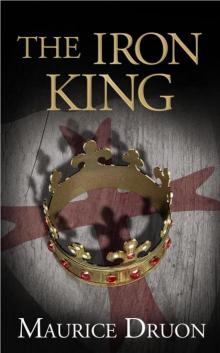 The Iron King
The Iron King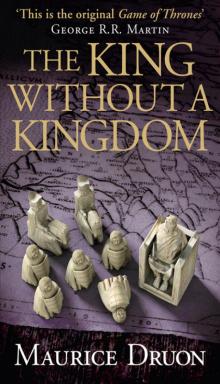 The King Without a Kingdom
The King Without a Kingdom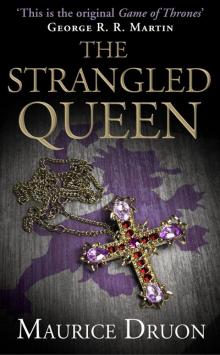 The Accursed Kings Series Books 1-3: The Iron King, the Strangled Queen, the Poisoned Crown
The Accursed Kings Series Books 1-3: The Iron King, the Strangled Queen, the Poisoned Crown The She-Wolf
The She-Wolf The Lily and the Lion
The Lily and the Lion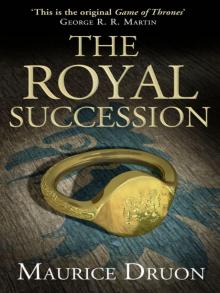 The Royal Succession
The Royal Succession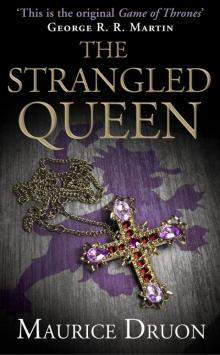 The Strangled Queen
The Strangled Queen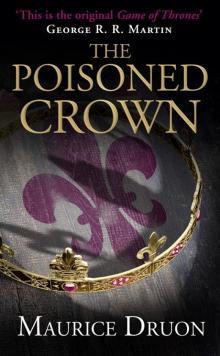 The Poisoned Crown
The Poisoned Crown